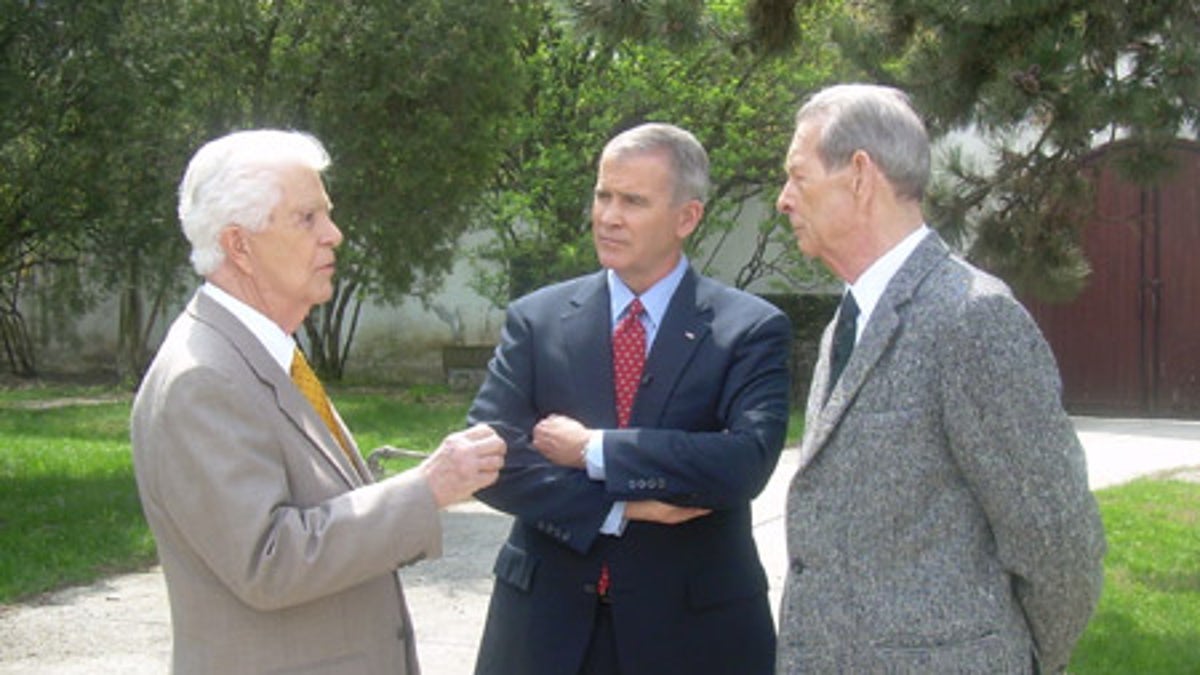
World War II veteran Bill Fili, Oliver North and King Michael (FNC)
In his free time, 85-year-old Bill Fili builds classic model airplanes. But during World War II, he flew on the real thing — a B-24 Liberator — in 34 combat missions over the skies of Europe.
At the recruiting station after the bombing of Pearl Harbor, Fili said he originally wanted to fix planes, not fly them. He didn't think he was fit enough to fly. "Just train me to be a mechanic," Fili said he told the interviewer. "I'll keep the airplanes flying."
In early 1942, while Fili was in mechanic school, the Army Air Corps needed extra gunners. Fili still didn't think he could hack it, but his squadron leader convinced him to take the test. "Fifty-four people… I was one of three that passed the physical to go flying... as a gunner and a flight engineer," Fili remembered.
• Catch the 'War Stories Classic: In the Jaws of Hell: Eastern Europe During World War II,' Saturday, April 27 at 3 a.m. ET
Flight training wasn't easy but Fili got through it. He and nine other flyboys were assigned to the B-24 Liberator, Destiny Deb. "We shipped out together. Sixty-two crews with 62 brand new airplanes from Ford who was building a B-24 at the time," Fili said. "My crew was the first to land on that airfield…first one to get the only dry spot in the field."
By early 1944, Destiny Deb and her crew were combating ferocious pilots of the German Luftwaffe in some of the most amazing missions over the skies of Italy and Germany. Soon they would have a new assignment: Destroy Adolph Hitler's precious oil stock at Ploesti in Romania.
During World War II, Romania was caught in a brutal vice between Hitler and Stalin. Hitler desperately needed oil for his tanks and planes to continue his conquest over Europe. Stalin, though officially an ally, had already murdered millions of his own people and had plans to expand his evil communist empire, starting with Eastern Europe. This region — including Yugoslavia, Bulgaria, Hungary, Poland and Romania — would suffer for decades under communist rule, spawned from the ashes of World War II.
Bill Fili's good luck ran out in April 1944. Destiny Deb was shot down during her second bombing raid to destroy the Ploesti oil fields. Fate was good to everybody that day — all 10 crew members survived, but had to endure four months as prisoners of war.
Over 60 years after that fateful day, "War Stories" flew Bill Fili back to Romania to tell his story. "We had the best tour guide imaginable," said producer Andy Stenner. "Bill Fili showed us where he was shot down over the Ploesti air fields and then where he was imprisoned in Bucharest."
"It was humbling to have the privilege of taking a veteran back to the very same battlefield on which he fought," recalled producer Ayse Wieting.
"War Stories" traveled to Bucharest, the capital of Romania and stopped at Calea Victoriei or "Victory Way." Producer Ayse Wieting was amazed by remnants of the 1989 revolution that overthrew the last Communist regime. "I remember being very affected by a building in downtown Bucharest which was riddled with bullet holes from that era," she said. "Communist architecture was still very much present."
In an exclusive interview, while in Bucharest "War Stories" spoke with King Michael of Romania, the young monarch who was caught in the vicious web between Hitler and Stalin. "What was most interesting about meeting King Michael was not that he is a bona fide monarch, but rather that he is one of the few surviving heads of state from World War II," said Wieting.
"War Stories" also reunited Bill Fili with King Michael at Elisabeta Palace. The last time the two had met was in a Romanian prison camp over 62 years ago. Fili is convinced that the king saved his life. Fili praised Michael's leadership during one of the toughest times in his country's history. "You prevented us from going to Germany and we thank you," said the veteran to the king. "Your people did everything they could to make life tolerable for us."
— Christina Diaz is a producer for "War Stories"
